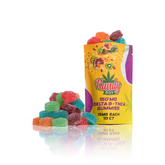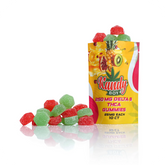What Makes THCa Edibles Different? A Deep Dive into Effects & Legality
THCa Edibles: Breaking Down the Buzz
If you’ve noticed THCa gummies and edibles appearing on more dispensary shelves and websites, you’re not imagining things. These products are quickly gaining popularity for their blend of smooth effects, full-spectrum benefits, and legal accessibility. But what are THCa edibles, exactly?
In simple terms, THCa (tetrahydrocannabinolic acid) is the raw, non-intoxicating compound found in cannabis before it’s exposed to heat. When you apply heat, a process known as decarboxylation, it converts into Delta-9 THC, the psychoactive molecule responsible for the “high” most people associate with cannabis.
So when THCa is infused into edibles, it becomes active in your body post-digestion, delivering all the benefits of Delta-9 in a more nuanced, full-bodied way. Think of it as a more grounded version of your classic edible, natural Delta 9 edibles with an entourage effect that hits deeper.
How THCa Edibles Work
Just like regular THC gummies, THCa edibles are metabolized through the digestive system. Once you ingest one, your liver transforms the THC into 11-hydroxy-THC—a stronger, longer-lasting version that lingers in your system for hours.
But there’s more to the experience than just potency. One of the key differences between Delta 9 edibles using THCa and traditional Delta-9 edibles is the “feel.” Because THCa preserves more of the original plant’s terpene and cannabinoid profile before activation, many users describe the experience as warmer, more complete, and less likely to cause anxiety.
For people who’ve tried Delta-9 and found it overwhelming, THCa might be the smoother ride they’ve been looking for.
THCa Edibles Benefits
Here are the most commonly reported THCa edibles benefits:
-
Relaxation – A calm, centered body effect without full sedation.
-
Mood enhancement – A lift in outlook without overstimulation.
-
Creative clarity – Great for journaling, painting, or productive flow.
-
Focus – Especially in low doses, THCa gummies for focus can help with task engagement.
-
Sleep support – High doses provide deep rest without grogginess.
-
Pain relief – Anecdotal feedback suggests help with inflammation and soreness.
-
Wellness support – For those avoiding smoke or vapes, THCa offers a lung-friendly option.
The key? A balance of activation and retention. These aren’t just another cannabinoid—they’re a bridge between raw cannabis energy and functional, feel-good relief.
Are THCa Edibles Legal?
You’re probably wondering: Are THCa edibles legal in your state?
Federally, yes. Under the 2018 Farm Bill, THCa edibles legal status is secured as long as the product is derived from hemp and contains less than 0.3% Delta-9 THC by dry weight. This means most THCa edibles are technically compliant on a federal level.
However, state laws vary. Some states treat THCa as a form of Delta-9 THC due to its potential activation. Others allow it freely as long as lab results prove it hasn’t been converted. So while THCa is legal, you should always double-check your state’s current cannabis regulations.
THCa vs Delta-9 Edibles: Key Differences
The THCa vs Delta-9 debate often boils down to a few key areas:
-
Base Compound: THCa is raw and must be activated, while Delta-9 is already active.
-
Feel: THCa feels smoother and more balanced. Delta-9 can feel more immediate and intense.
-
Onset Time: THCa often takes 45–90 minutes to kick in. Delta-9 tends to activate around 30–75 minutes.
-
Effects: THCa tends to preserve more of the plant's natural compounds, offering a richer experience.
-
Legal Definition: THCa is legal under different interpretations, especially before heating. Delta-9 has stricter thresholds.
In short, if you’re comparing THCa vs Delta 9 edibles, the decision comes down to how fast, how strong, and how nuanced you want your experience to be.
What to Expect: THCa Edibles Effects
Wondering about THCa edibles effects?
Here’s what users report most often:
-
A clean onset that builds slowly
-
Elevated mood without mental fog
-
A body-centered calm that stays in the background
-
Long-lasting clarity and tranquility
-
Less anxiety than some Delta-9 experiences
That’s not to say THCa can’t hit hard—it absolutely can, especially in higher doses. But even then, it feels more like a body-led buzz than a cerebral rocket launch.
For those curious about microdosing, you can even find a microdose Delta 9 edible with just 5–10mg, offering subtle calm without full intoxication.
Who Should Try THCa Gummies?
These edibles are great for:
-
First-time edible users exploring cannabis gently
-
Wellness-focused consumers seeking smoke-free relief
-
Artists and creators looking for light, long-lasting flow
-
People needing calm or clarity without a crash
-
Those exploring THCa gummies for anxiety or stress reduction
At Kandy Boy, we go a step further by offering lab tested Delta 9 edibles and third party tested edibles with every batch—so you never have to guess what’s in your gummy.
Choosing a Product: Start with the 150mg Delta-9 THCa Pack
Not sure where to begin? Start small with the 150mg Delta-9 THCa Pack.
Each pack includes 10 gummies with 15mg of THCa, perfect for introducing your system to this full-spectrum compound. You’ll enjoy consistent onset, vibrant flavors, and a smooth ride that doesn’t overwhelm.
FAQs – THCa Edibles
Q: What are THCa edibles?
A: They’re edibles infused with tetrahydrocannabinolic acid (THCa), which converts to Delta-9 THC after digestion, offering a full-spectrum high with smoother effects.
Q: Are THCa edibles legal?
A: Yes—federally. As long as they’re hemp-derived and stay under 0.3% Delta-9 THC by weight. However, state laws may interpret this differently.
Q: What are the side effects of THCa edibles?
A: Some users report dry mouth, fatigue, or mild dizziness at high doses. Always start small and monitor your body.
Q: Are THCa edibles good for anxiety or focus?
A: Many users report that THCa gummies for anxiety or THCa gummies for focus deliver consistent, smooth effects without mental fog or jitteriness.
Q: Do you offer vegan or organic THCa gummies?
A: Yes. Kandy Boy offers natural Delta 9 edibles in vegan-friendly formulations, always third-party tested.






